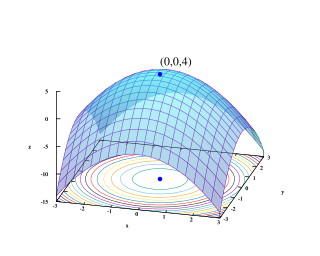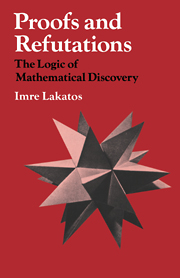
Argument from ignorance, also known as appeal to ignorance, is a fallacy in informal logic. It asserts that a proposition is true because it has not yet been proven false or a proposition is false because it has not yet been proven true. This represents a type of false dichotomy in that it excludes the possibility that there may have been an insufficient investigation to prove that the proposition is either true or false. It also does not allow for the possibility that the answer is unknowable, only knowable in the future, or neither completely true nor completely false. In debates, appealing to ignorance is sometimes an attempt to shift the burden of proof. The term was likely coined by philosopher John Locke in the late 17th century.

The travelling salesman problem (TSP) asks the following question: "Given a list of cities and the distances between each pair of cities, what is the shortest possible route that visits each city exactly once and returns to the origin city?" It is an NP-hard problem in combinatorial optimization, important in theoretical computer science and operations research.
Heuristic routing is a system used to describe how deliveries are made when problems in a network topology arise. Heuristic is an adjective used in relation to methods of learning, discovery, or problem solving. Routing is the process of selecting paths to specific destinations. Heuristic routing is used for traffic in the telecommunications networks and transport networks of the world.
A heuristic argument is an argument that reasons from the value of a method or principle that has been shown experimentally to be useful or convincing in learning, discovery and problem-solving, but whose line of reasoning involves key oversimplifications that make it not entirely rigorous. A widely used and important example of a heuristic argument is Occam's Razor.

Mathematical optimization or mathematical programming is the selection of a best element, with regard to some criterion, from some set of available alternatives. It is generally divided into two subfields: discrete optimization and continuous optimization. Optimization problems arise in all quantitative disciplines from computer science and engineering to operations research and economics, and the development of solution methods has been of interest in mathematics for centuries.
A heuristic, or heuristic technique, is any approach to problem solving or self-discovery that employs a practical method that is not guaranteed to be optimal, perfect, or rational, but is nevertheless sufficient for reaching an immediate, short-term goal or approximation. Where finding an optimal solution is impossible or impractical, heuristic methods can be used to speed up the process of finding a satisfactory solution. Heuristics can be mental shortcuts that ease the cognitive load of making a decision.

A greedy algorithm is any algorithm that follows the problem-solving heuristic of making the locally optimal choice at each stage. In many problems, a greedy strategy does not produce an optimal solution, but a greedy heuristic can yield locally optimal solutions that approximate a globally optimal solution in a reasonable amount of time.
Branch and bound is a method for solving optimization problems by breaking them down into smaller sub-problems and using a bounding function to eliminate sub-problems that cannot contain the optimal solution. It is an algorithm design paradigm for discrete and combinatorial optimization problems, as well as mathematical optimization. A branch-and-bound algorithm consists of a systematic enumeration of candidate solutions by means of state space search: the set of candidate solutions is thought of as forming a rooted tree with the full set at the root. The algorithm explores branches of this tree, which represent subsets of the solution set. Before enumerating the candidate solutions of a branch, the branch is checked against upper and lower estimated bounds on the optimal solution, and is discarded if it cannot produce a better solution than the best one found so far by the algorithm.
Dendral was a project in artificial intelligence (AI) of the 1960s, and the computer software expert system that it produced. Its primary aim was to study hypothesis formation and discovery in science. For that, a specific task in science was chosen: help organic chemists in identifying unknown organic molecules, by analyzing their mass spectra and using knowledge of chemistry. It was done at Stanford University by Edward Feigenbaum, Bruce G. Buchanan, Joshua Lederberg, and Carl Djerassi, along with a team of highly creative research associates and students. It began in 1965 and spans approximately half the history of AI research.

Proofs and Refutations: The Logic of Mathematical Discovery is a 1976 book by philosopher Imre Lakatos expounding his view of the progress of mathematics. The book is written as a series of Socratic dialogues involving a group of students who debate the proof of the Euler characteristic defined for the polyhedron. A central theme is that definitions are not carved in stone, but often have to be patched up in the light of later insights, in particular failed proofs. This gives mathematics a somewhat experimental flavour. At the end of the Introduction, Lakatos explains that his purpose is to challenge formalism in mathematics, and to show that informal mathematics grows by a logic of "proofs and refutations".
A computer-assisted proof is a mathematical proof that has been at least partially generated by computer.
Evaluation is the process of judging something or someone based on a set of standards.

The following outline is provided as an overview of and topical guide to thought (thinking):
Logic optimization is a process of finding an equivalent representation of the specified logic circuit under one or more specified constraints. This process is a part of a logic synthesis applied in digital electronics and integrated circuit design.
Search optimization may refer to:
The genetic algorithm is an operational research method that may be used to solve scheduling problems in production planning.
In mathematical optimization and computer science, heuristic is a technique designed for problem solving more quickly when classic methods are too slow for finding an exact or approximate solution, or when classic methods fail to find any exact solution in a search space. This is achieved by trading optimality, completeness, accuracy, or precision for speed. In a way, it can be considered a shortcut.
A hyper-heuristic is a heuristic search method that seeks to automate, often by the incorporation of machine learning techniques, the process of selecting, combining, generating or adapting several simpler heuristics to efficiently solve computational search problems. One of the motivations for studying hyper-heuristics is to build systems which can handle classes of problems rather than solving just one problem.
Matheuristics are problem agnostic optimization algorithms that make use of mathematical programming (MP) techniques in order to obtain heuristic solutions. Problem-dependent elements are included only within the lower-level mathematic programming, local search or constructive components. An essential feature is the exploitation in some part of the algorithms of features derived from the mathematical model of the problems of interest, thus the definition "model-based heuristics" appearing in the title of some events of the conference series dedicated to matheuristics matheuristics web page.





